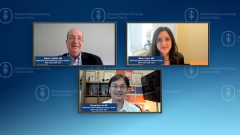
Renal Cell Carcinoma: Future Directions in Care
Looking toward the future management of renal cell carcinoma, experts consider treatment strategies for bone metastasis, brain metastasis, and VHL disease.
Episodes in this series

Transcript:
Robert J. Motzer, MD: Two last quick points for you. Cabozantinib is 1 of our main go-to drugs for RCC [renal cell carcinoma]. It’s been proposed to be particularly effective for bone metastases, right? There were recent data for cabozantinib and brain metastases. Both of those 2 groups have been always considered to be resistant, difficult-to-treat areas. Can you give us some insight in terms of cabozantinib for bone metastases or how you manage bone metastases? Is there anything new? What are your mainstream treatments for patients with brain metastases?
Chung-Han Lee, MD:From subgroup analyses, there have been the best retrospective studies looking at the utilization of cabozantinib for that population. There may be better brain penetration of cabozantinib compared with some of the other TKIs [tyrosine kinase inhibitors]. One thing we’d certainly be interested in doing is looking at this in a more prospective fashion.
Historically speaking, bone metastases have always been quite challenging to treat, with lower levels of activity against some of the TKIs like sunitinib and pazopanib. Cabozantinib was the first to demonstrate more clear activity within people who have bone metastases. Even some of the more recent subgroup analyses, including cabozantinib-nivolumab, redemonstrated that activity in people with bone metastases. That has also been studied with the combination of lenvatinib plus pembrolizumab, which demonstrated levels of activity for bone metastases.
There’s still more discussion about the optimal management for bone metastases from a systemic therapy standpoint. However, our big question is about being treatment resistant. For weight-bearing bones, that may become a problem for things like fracture. Assessment by orthopedic and radiation oncology may be necessary to delay and defer potential sequelae from bone metastases down the line.
Robert J. Motzer, MD:Thanks for those thoughts on 2 subgroups of patients. In terms of closing discussion, 1 point we should cover briefly—perhaps Maria can comment—is the recent data and FDA approval for belzutifan in VHL [Von Hippel-Lindau syndrome] RCC. That seems like a real breakthrough in terms of a therapy that can effectively treat a familial form of RCC and other manifestations. In closing, Maria, do you want to highlight your thoughts on that data and what it means to you?
Maria I. Carlo, MD:Yes. It’s extremely exciting that there’s an FDA-approved option with significant efficacy for patients with VHL tumors, not just kidney cancer but hemangioblastomas, retinal angiomas, and the pancreatic neuroendocrine tumors. It’s opened. Fortunately, we don’t tend to see patients with VHL in our medical oncology clinic because they rarely metastasize, especially if watch carefully by a surgeon. But they do have to undergo a lot of surgeries to remove renal masses. The data published from both show nearly 100% disease control rate and about a 50% response rate in these tumors for that drug. Certainly, we’re seeing patients referred for this. For patients who have multiple clear cell kidney cancer tumors, it’s more important than ever to consider genetic testing, or at least a full genetic work-up, because they may be eligible for this drug if they’re found to have VHL syndrome.
Robert J. Motzer, MD:All right. Thanks very much. Great discussion, great cases, and lots of progress and excitement in this field. I’d like to thank both of you for joining me in this discussion and thank the audience for their attention.
Transcript edited for clarity.






































